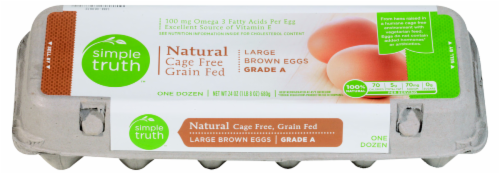Google defines freedom as "the state of not being imprisoned or enslaved" and "the power or right to act, speak, or think as one wants without hindrance or restraint." There are a few other definitions, but these two are probably the most relevant.
Speaking of free Kroger eggs, many of these cartons have labels that say "cage-free" or "free-range." Cage-free, despite popular belief, is more or less replacing a smaller cage with a bigger cage. Free-range is the same; the chickens that lay the eggs just have a wider space to roam, but they are still limited in how far they can move. Indeed, the chickens have some freedom as cage-free and free-range suggest, but they aren't actually free. They're owned by farmers or other people and can't go where they please (and if they weren't, we wouldn't have chicken or eggs as they would all wander off in some aimless direction). In any case, chickens can't really be called "enslaved" as they do no work and probably don't mind their state of affairs, but they're definitely imprisoned on their farms/factories. The chickens don't care, in any case.
In order to be free, however, being able to go wherever is not enough. Patrick Henry equates being free with "preserv[ing] inviolate those inestimable privileges" (Henry 230) that were taken away from him and the rest of the colonists. The trusty Google dictionary defines privilege as "special rights" granted to people; moreover, Google defines right as "a moral or legal entitlement to have or obtain something or to act in a certain way."
The "legal entitlement" part is easy to explain. The government grants rights and, by the transitive property of equality, freedoms. This should be a logical conclusion with no flaws- but there is one big contradiction. If the government is the one granting rights, are people truly free? They can exercise the right, but only within the bounds the government dictates. The right is in the hands of the government, not the person- the government controls the freedom, so "legal entitlement" is not a true freedom.
"Moral entitlement" is a bit harder to deduce, so it's easier to think of them as "moral rights" or "natural rights." One way of viewing them is that they are "[unalienable rights] endowed by [our] Creator" (Jefferson 236). This would be acceptable if morals were entirely based on religion, but many of society's morals aren't derived from God. This brings up another point: moral rights and morals in general only work if society agrees on them. Someone's own moral code made counteract with another person's, but who is right? Let's say I just dropped a fire diss track on someone, and he or she was greatly offended by it. I may have the freedom of speech, but there's one catch; many people forget about pursuit of happiness. Society has dictated insults are (more or less) morally wrong and they should be used sparingly (or not at all). Defining "natural rights" as the right to have my will protected and to protect the wills of others, I have therefore infringed on the poor victim's natural or moral rights- however, the only reason I think this is due to my morals. I would have thought nothing of it if not for my morals, and morals are created by society. My sense that insults are "wrong" is universally agreed upon by society. As such, moral rights were created from generations of human thought and realization and thus are not a true freedom.
True freedom is unobtainable. People will always be around to hamper freedom through laws or morals. Going against what society thinks is one thing, but laws still limit what someone can do. People in a government-less area will still think murder is wrong and punish the culprit. This is not to say being truly free means being a heartless anarchist, as that will probably mean death with everyone being your enemy. Instead, be like a chicken; despite the obvious boundaries, mind your own business as you do as you please. That mindset is the closest to true freedom as anyone can get.



I like how you compared "free" in terms of grocery to freedom of American people, showing how their are some restrictions to freedom
ReplyDeleteI totally agree that the concept of true and complete freedom is something that is something that unobtainable. But if you had to define it what would you say?
ReplyDeleteI liked how you took things that seemed free, but showed that they really aren't. What things would you consider free then if you consider it unobtainable? Does this mean there's no such thing as freedom and that it's all just psychological?
ReplyDelete